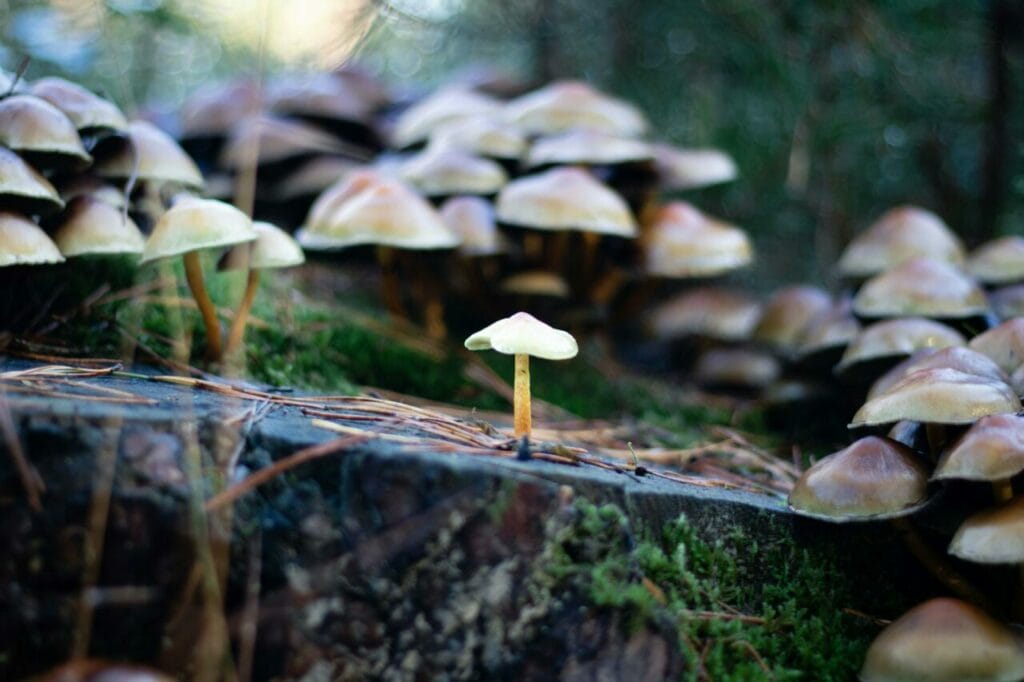Alzheimer’s Disease (AD), a severe neurodegenerative disorder with no known cure, continues to increase in prevalence, presenting a significant challenge. Scientists are investigating better treatment methods through the study of both natural and synthetic alternatives.
A number of clinical trials have highlighted the potential of serotonergic psychedelics like LSD, DMT, and psilocybin in the treatment of Alzheimer’s disease. For more fascinating insights, feel invited to explore online resources or consider “purchasing psychedelics online in Canada.”
[toc]
Psychedelics in Alzheimer’s Treatment
Traditional psychedelics exhibit promise in treating early-stage Alzheimer’s Disease (AD) or mild cognitive impairment (MCI) by fostering brain cell growth.
By targeting specific brain receptors, psychedelics can promote neural plasticity for learning and memory, potentially slowing or even reversing the neurodegenerative effects of AD. Furthermore, psychedelics may help to alleviate depression and anxiety, which are often found in AD patients, by inducing positive psychological impacts.
Many uncertainties remain about how psychedelic treatments work. Some believe that experiencing profound high-dose psychedelic effects, like mystical sensations or self-dissolution, is essential for reaping psychological benefits. Others suggest that the biological changes prompted by these substances are key. Both viewpoints may be valid.
Traditional psychedelics appear to aid the brain in adapting and reducing inflammation, even at lower doses. Therefore, low-dose treatments could potentially benefit conditions like brain degeneration or migraines without producing significant mind-altering effects. However, for conditions like depression, anxiety, or addiction, the mind-altering effects seem to be essential, promoting introspection and behavioural changes. Consequently, both low and high doses deserve further investigation for personalized therapy.
Impact of Serotonergic Psychedelics
Serotonergic psychedelics, such as LSD (lysergic acid diethylamide), DMT (dimethyltryptamine), and psilocybin (found in magic mushrooms), are gaining attention
Due to their potential therapeutic effects on numerous mental health disorders, these substances are gaining increased interest.
Experts believe that the serotonin receptors, recognized for boosting cognition and regulating neuroplasticity, offer a promising research avenue for Alzheimer’s Disease (AD).
These substances primarily produce their pharmacological impacts by modifying the brain’s serotonin system, leading to alterations in perception, mood, and consciousness. Various studies support this idea with the following findings:
- In particular, the 5-HT2A subtype of serotonin receptors influences the gene expression of neuroplasticity-enhancing neurotrophins in brain areas affected by AD.
- These receptors govern cortical signalling, vital for cognition, memory, and synaptic plasticity.
- Despite their unusual placement within neurons, serotonin receptors play a role in neural development, regeneration, and plasticity.
Significant Research Findings
- By promoting neuroplasticity, serotonergic psychedelics have shown potential in alleviating certain aspects of AD pathology.
- Classic psychedelics influence neurotransmission, stimulate synaptic remodelling, and enhance factors that support neuronal survival.
- Specific psychedelics, such as muscimol and Sig-1R agonists, may help reduce the neurotoxicity associated with AD progression.
- By activating pathways in brain regions affected by AD, classic psychedelics could potentially slow down or reverse brain degeneration.
- Psilocybin mushrooms stimulate neural plasticity, promoting neurogenesis and causing lasting changes in brain circuits.
- By targeting receptor genes and initiating neuronal and network changes, psychedelics enhance brain connectivity.
Clinical research shows that both classic and non-classic psychedelics from magic mushrooms affect various biological processes in the brain. These effects encompass rapid shifts in gene expression and considerable changes in brain structure and function.
Psychedelics interact with receptors such as serotonin, sigma, NMDA, and GABA, resulting in increased synaptic plasticity and brain rejuvenation. Consequently, psychedelics might have positive effects on behaviour, memory, and cognition, positioning them as potential treatment options for AD and related disorders.
Buy Psychedelics Online in Canada
Welcome to our online hub where we offer a vast selection of psychedelic products in British Columbia, Canada. If you’re considering the microdosing of magic mushrooms, we suggest starting your exploration with a reliable medicinal mushroom dispensary.
- LSD
LSD, a manufactured drug, is derived from a species of fungi called ergot found on rye grains. This potent psychoactive substance can modify perceptions, emotions, and thought processes even in minor doses.
Be careful, as overconsumption of LSD can lead to intense hallucinations, altering your perception of time and space. Beware of substances marketed as LSD as they could be other drugs such as NBOMe or belong to the 2C drug family.
| Product | Kittease – Ketamine Microdose Troche (30x50mg) | Zenly – LSD Gel Tabs – 600ug (100ug Per Tab) | Zenly – LSD Gummies – Sour Zen Berry – 200ug (100ug Per Gummy) |
| Purpose | Stress, depression, pain management, PTSD, OCD, work-related stress, performance anxiety, insomnia, and addiction. | Outstanding experiences | Outstanding experiences |
| Dosage | 50mg per troche / 30 per pack – 1.5 grams of ketamine/ per pack | 600ug total/6 Tabs (100ug/Tab) | 200ug total/2 Gummies (100ug/Gummy) |
| Usage Instructions | Consume one full troche | Take one full tab to experience the full effect. Wait a minimum of 2 hours before taking another. | Consume one full gummy to experience the full effect. Wait a minimum of 2 hours before taking another. |
| Benefits | Quick action with minimal risk, enhanced receptivity, ideal for introspection and cognitive improvement. | Accurately measured dose for the perfect trip, laboratory-verified. | Accurately measured dose for the perfect trip, laboratory-verified. |
- Magic Mushrooms
Over 180 species of mushrooms contain psilocybin and psilocin, elements hailed for their therapeutic benefits and positive effects on mental health.
Various factors, including the mushroom species, cultivation batch, consumed quantity, and individual tolerance levels, can greatly influence the effects experienced. While some people prefer microdosing to achieve subtle effects, others opt for larger doses for a more significant experience. The cultivation methods also contribute to the quality of the output.
Blue Meanies, scientifically referred to as Panaeolus cyanescens, are small dried fungi that thrive in warm tropical climates, specifically on cow and water buffalo dung. Their name is derived from the blue specks that appear on their surface upon maturity.
- These fungi are rich in psilocybin and psilocin, which are highly concentrated.
- They have a history of recreational use, especially among the Balinese people, who use them during celebrations and for artistic inspiration.
- Tourists and travelers in Bali and similar places favor them due to their hallucinogenic properties. These effects can include feelings of euphoria, hallucinations, happiness, and intense laughter.
- DMT
DMT, an intense hallucinogenic compound, is found in certain plants, among them Psychotria viridis and Chacruna. Often dubbed the “spirit molecule,” these controlled substances can trigger deep psychedelic experiences. They offer a short but extremely immersive excursion characterized by vivid visual and auditory hallucinations.
| Product | Dream Machine – Vape Cartridge – DMT 1ml | Integral Alchemist – ACACIA Changa Pre-Roll | Integral Alchemist – Mimosa- 1ml DMT Vape Cart |
| Description | Explore hyperdimensional realms with DMT. | Experience ayahuasca-like effects by combining a blend of herbs and DMT. | Commence a journey of mystical visions and spiritual insights with DMT. |
| DMT Content | 1g | Approximately 90mg | 1ml |
| Instructions | Preheat the cartridge and inhale | Consume the pre-roll smoke at a pace that suits you. | Take a breath of the vapor for instant effects. |
| Effects | Intense hallucinations, modified state of consciousness. | A visual journey of psychedelia, lasting for an extended period. | Spiritual awakening, joy, significant changes in outlook. |
| Duration | Varies from person to person | Can last up to 1 hour | Can last up to 30 minutes |
The Long-Term Effects of Using Psychedelics
Current research is focused on understanding the enduring consequences of psychedelic substance use. The term “long-term effects” pertains to any lasting changes in cognition, emotion, or memory that may occur after sustained psychedelic use. Even though this is an expanding field of study, much is still unknown.
The exploration into the lasting effects of psychedelics is complex. While some studies suggest potential mental health benefits, others indicate possible risks, such as the onset of psychosis.
Regardless of the challenges, researchers persist in their efforts to understand the implications of chronic psychedelic use on mental health. They carry out thorough research and monitor study participants over long periods to collect more accurate data.
Procure Cannabis from a Licensed Provider
Research suggests a significant shift in the treatment approach to Alzheimer’s disease, indicating that psychedelics could revolutionize the way we tackle brain disorders. Experts are of the opinion that the therapeutic use of these substances could dramatically alter the treatment landscape for Alzheimer’s, offering a new sense of hope to numerous patients and their loved ones.
For premier products, opt for a certified provider such as Mushroom Gummies Canada. Offering a broad range of cannabis products including flowers, edibles, concentrates, and more, Mushroom Gummies Canada assures genuine, lab-tested items that meet strict food and drug regulations.
Purchase shrooms online now.
Frequently Asked Questions
How do psychedelics differ from other substances commonly used in Alzheimer’s treatments?
Psychedelics distinguish themselves from traditional Alzheimer’s medications through their therapeutic process and effects. They foster the formation of new neural connections by targeting the brain’s serotonin system, facilitating profound psychological experiences that nurture emotional well-being.
Unlike standard drugs that primarily manage symptoms, psychedelics are being assessed by Health Canada for their long-term benefits and comprehensive treatment approach, which includes therapy.
Research into the use
The therapeutic potential of psilocybin in treating conditions like obsessive-compulsive disorder, along with its safety record in preventing multi-organ system failure, distinguishes it from the usual controlled substances.
Could psychedelic-assisted therapy be a viable treatment for end-of-life distress in Alzheimer’s patients?
Psychedelic-assisted therapy could potentially offer comfort to Alzheimer’s patients who are seriously ill and facing end-of-life challenges.
- Provides emotional solace. This therapy has been successful in reducing anxiety and sorrow in some individuals, especially those who are critically ill. This could also be advantageous for Alzheimer’s patients.
- Typically safe under supervision. Administering psychedelics like these in a controlled setting under a professional therapist’s supervision is generally harmless and well received by most people.
- May improve quality of life. For an Alzheimer’s patient, emotional improvement can make a remarkable difference, even without any enhancement in memory function.
- Further research is required. Although this therapy seems promising, additional studies are needed to validate its safety and effectiveness for Alzheimer’s patients, particularly those in the late stages of life.
How long is a psychedelic therapy session for Alzheimer’s patients?
- Preparation Phase. This phase includes one or two sessions that last between 1 to 2 hours each. The purpose of these sessions is to ready the patient for the impending experience, establish expectations, and build a trusting therapist-patient relationship.
- Primary Psychedelic Session. This key session, where the patient consumes the psychedelic substance, usually spans between 4 to 6 hours. The patient spends this time in a controlled environment, typically lying down wearing eye shades and listening to music, under the careful supervision of therapists.
- Integration Phase. After the session, follow-up meetings are held to help the patient interpret and integrate their experience. These sessions usually last 1 to 2 hours each, with the number of sessions varying based on the patient’s needs.
You might also be interested in:





